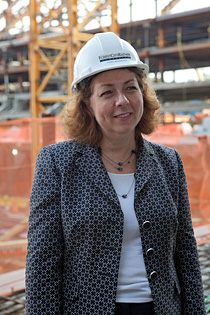
From left, Josie Mok '98, Eileen Weingarten '75, Rebecca DeMarinis D'Eloia '98, Kate Bicknell '99 and Julie Margolin '99 at the Barclays Center construction site at Atlantic Yards in Brooklyn. Photo by Gerri Hernández.
Alumnae at NYC development firm are shaping the city's future

Rendering of the Barclays Center in Brooklyn, a $4.9 billion sports arena, business and residential complex that also will be home to the Nets basketball team when it opens in fall 2012.
Cornell women are at the forefront of change in New York City -- and at Forest City Ratner Companies, a handful of alumnae in particular are driving the development of some of the newest buildings and properties that are building the city's future.
They came from different colleges and degree programs, but all are now in senior leadership positions at the real estate management and development firm during some of the biggest New York City-based projects in its history -- from the New York Times Building and 8 Spruce Street (designed by Frank Gehry and one of the tallest residential buildings in the Western Hemisphere) to Atlantic Yards and the Barclays Center in Brooklyn, a $4.9 billion sports arena, business and residential complex under construction.
Eileen Weingarten is a 1975 graduate of the College of Architecture, Art and Planning (AAP) and is a vice president in the department of design and construction; Kate Bicknell earned her degree in urban and regional studies at AAP in 1999 and is a vice president in commercial and residential development; Josie Mok is a 1998 School of Hotel Administration graduate and vice president of investment management; and Rebecca DeMarinis D'Eloia is a 1998 ILR School graduate and a vice president in commercial and residential development.

A view of Barclays Center under construction in September 2011.
Forest City also just brought one more Cornell alumna on board for the rapidly developing Barclays Center, which is expected to open in fall 2012 and will be the new home for the Nets basketball team. Julie Margolin, a 1999 Hotel School graduate and director of operations for Levy Restaurants, has been hired as director of operations for food and beverage at the Barclays Center.
Prior to their careers at Forest City, only Mok and Margolin knew each other -- at Cornell, they spent a semester working on Hotel Ezra Cornell on the same subcommittee.
"I think Bruce Ratner hires the best," Weingarten says of the CEO of Forest City Ratner's New York City division. "That's how we ended up together."
But the Cornell women say that as they have gotten to know each other, similarities across their Cornell experiences and the career preparation they received quickly became apparent.
"I do a lot of infrastructure work, and I didn't study that at all at Cornell," Weingarten says. "It was the rigor and the discipline of the program. The architecture program is basically problem-solving, figuring out how to solve a problem you've never seen before. That's what we're doing here; we come across problems that none of us has seen before, but we figure out a way to solve them."

From left, Margolin, D'Eloia, Weingarten, Bicknell and Mok chat at the Barclays Center site. "I'd like to think that among the group here on this [Atlantic Yards] project, we're the most highly represented university among the teams working on it," Mok says. Photo by Gerri Hernández.
D'Eloia, who worked for the New York City Parks Department (and recruited Cornell graduates to work there) before coming to Forest City, says Cornell has very strong ties to New York City and its business world. "The ILR School in particular has a very career-focused program … it really prepared me to jump right into the workforce, taking on project management roles," she says. "We're taking ideas from inception through execution, and I know that my Cornell experience was very focused on that."
The Hotel School also is very focused on directing graduates out of the academic world and directly into professional careers, Margolin says, adding that her education and experience "really put me into a position where I could step in and take on a very senior leadership role right away in the hospitality industry."
Bicknell first worked as a legislative aide in former Sen. Patrick Moynihan's office in Washington, D.C., and then as a policy director at the nonprofit Smart Growth America, working on redevelopment policy, before going to business school and then to Forest City Ratner, which "ended up being exactly what I had been hoping to find -- mixed-use, mixed-income, transit-oriented development," she says.
"There aren't that many firms doing the type of development Forest City is doing," Bicknell says. "A lot of public/private partnerships, a lot of redevelopment work. It's about building strong cities … major urban markets, large scale, often very challenging projects that we figure out."
Mok worked for two years in her native Miami for Ernst & Young before moving to New York City. She concentrated in operations management at the Hotel School, and it was classes in finance and strategic management that prepared her to work immediately on assignments that went beyond the hospitality industry. "The quantitative classes, all of the group dynamics, and the team effort environment, that certainly has been an asset to the other groups I've worked with," she says.
"I'd like to think that among the group here on this [Atlantic Yards] project, we're the most highly represented university among the teams working on it," Mok says. "From the development side, certainly, it seems like there is a commonality that has brought us here."
On the CornellNYC Tech Campus proposal

Eileen Weingarten '75. Photo by Gerri Hernández.
The women are aware of Cornell's developing proposal to build a New York City technology campus in response to Mayor Michael Bloomberg's request for proposals for such a campus that would benefit New York City economic development.
D'Eloia says an increased presence by Cornell in New York City would be welcomed by the many resources -- especially alumni -- already living and working in the city.
If Cornell is successful in its bid, that would "speak to [Cornellians'] work ethic, the commitment level and the ability to think on your feet and work toward successful problem-solving no matter what you're faced with," Margolin says. "It's ingrained in you in any program that you participate in at Cornell."
This is something the women recognize when they come across other Cornell graduates, male or female. "You have an understanding and an expectation of what they're capable of doing," Margolin says, "and an appreciation and respect for what you know they were committed to during their education and ultimately where they've gotten to professionally and what they've done to use that education."
"I recognize that in all of us," Weingarten says.